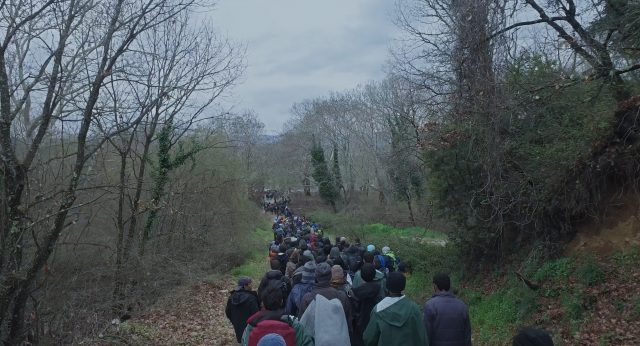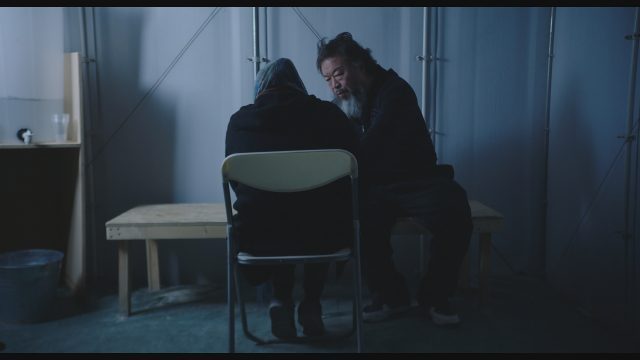
Ai Weiwei takes a close look at the international refugee crisis in Human Flow
HUMAN FLOW (Ai Weiwei, 2017)
Quad Cinema, 34 West 13th St. between Fifth & Sixth Aves., 212-255-2243, Wednesday, January 3, 4:30
BAMcinématek, BAM Rose Cinemas, 30 Lafayette Ave. between Ashland Pl. & St. Felix St., 718-636-4100, Wednesday, January 3, 7:00
www.humanflow.com
 On January 3, Chinese dissident artist Ai Weiwei will travel from Manhattan to Brooklyn, participating in two Q&As following screenings of his stunning new documentary, Human Flow. This past fall, Ai had several concurrent exhibitions in New York City that dealt with the international refugee crisis. At Deitch Projects in SoHo, “Laundromat” included racks of clothing that had been worn by Syrian refugees at the Idomeni refugee camp in Iraq, all freshly cleaned and pressed, as if ready to give the migrant men, women, and children a new lease on life. Among other items, the gallery show also featured several monitors playing footage that Ai had shot in various refugee camps, film that has now been turned into Human Flow. In 2016, Ai and his crew traveled to twenty-three countries, visiting dozens of camps in a year in which it was estimated that there were as many as 65 million displaced people around the world, fleeing war, poverty, famine, and persecution. In his first full-length documentary, Ai moves from macro to micro, shooting at a variety of scales. He uses drones to photograph tent cities in the desert from high above — reminiscent of the photography of Edward Burtynsky, turning individual items into parts of a vast pattern — along with gorgeous scenes of deserts and seascapes and intimate cell-phone footage and handheld camera shots that put viewers right in the middle of these makeshift villages, where some families live for decades. Ai, with his scruffy gray beard and in a hoodie, is often shown not only taking cell-phone videos but helping out and mingling with the refugees as dinghies arrive on the shores of Lesbos, Greece, or playfully trading passports with a refugee. Throughout the film, men and women stand proudly, often in traditional dress, looking directly at the camera for extended lengths of time, establishing their unique individuality, putting faces to what is most often seen in news clips as swaths of people struggling to survive. As Ai travels to each successive camp, he posts relevant quotes from writers and philosophers from that nation, from Turkish poet Nazim Hikmet, the Dhammapada Buddhist scripture, and Persian poet Baba Tahir to Kurdish poet Sherko Bekas, Syrian poet Adonis, and U.S. president John F. Kennedy. Details about the situations are sometimes delivered news-crawl-style, along the bottom of the screen.
On January 3, Chinese dissident artist Ai Weiwei will travel from Manhattan to Brooklyn, participating in two Q&As following screenings of his stunning new documentary, Human Flow. This past fall, Ai had several concurrent exhibitions in New York City that dealt with the international refugee crisis. At Deitch Projects in SoHo, “Laundromat” included racks of clothing that had been worn by Syrian refugees at the Idomeni refugee camp in Iraq, all freshly cleaned and pressed, as if ready to give the migrant men, women, and children a new lease on life. Among other items, the gallery show also featured several monitors playing footage that Ai had shot in various refugee camps, film that has now been turned into Human Flow. In 2016, Ai and his crew traveled to twenty-three countries, visiting dozens of camps in a year in which it was estimated that there were as many as 65 million displaced people around the world, fleeing war, poverty, famine, and persecution. In his first full-length documentary, Ai moves from macro to micro, shooting at a variety of scales. He uses drones to photograph tent cities in the desert from high above — reminiscent of the photography of Edward Burtynsky, turning individual items into parts of a vast pattern — along with gorgeous scenes of deserts and seascapes and intimate cell-phone footage and handheld camera shots that put viewers right in the middle of these makeshift villages, where some families live for decades. Ai, with his scruffy gray beard and in a hoodie, is often shown not only taking cell-phone videos but helping out and mingling with the refugees as dinghies arrive on the shores of Lesbos, Greece, or playfully trading passports with a refugee. Throughout the film, men and women stand proudly, often in traditional dress, looking directly at the camera for extended lengths of time, establishing their unique individuality, putting faces to what is most often seen in news clips as swaths of people struggling to survive. As Ai travels to each successive camp, he posts relevant quotes from writers and philosophers from that nation, from Turkish poet Nazim Hikmet, the Dhammapada Buddhist scripture, and Persian poet Baba Tahir to Kurdish poet Sherko Bekas, Syrian poet Adonis, and U.S. president John F. Kennedy. Details about the situations are sometimes delivered news-crawl-style, along the bottom of the screen.

Ai Weiwei gets deeply involved in situation in Human Flow
In addition to giving voice to the refugees themselves — “Where am I supposed to start my new life?” one woman asks — Ai speaks with crisis workers on the ground and United Nations officials and other experts, such as UNHCR Communications Officer Boris Cheshirkov, Princess Dana Firas of Jordan, Human Rights Watch Emergencies Director Peter Bouckaert, UN High Commissioner for Refugees Filippo Grandi, UNHCR Pakistan Senior Operation Coordinator Marin Din Kajdomcaj, UNICEF Lebanon representative Tanya Chapuisat, former Syrian astronaut Mohammad Fares, Dr. Cem Terzi of the Association of Bridging Peoples, and Dr. Kemal Kirişci, a senior fellow at the Brookings Institution who gets right to the point, explaining, “It’s going to be a big challenge to recognize that the world is shrinking, and people from different religions, different cultures, are going to have to learn to live with each other.” The powerful, immersive film was edited by Niels Pagh Andersen, who worked on Joshua Oppenheimer’s searing The Act of Killing and The Look of Silence, from nine hundred hours of footage, with a score by Karsten Fundal and a dozen cinematographers, among them Ai, Christopher Doyle, Zhang Zanbo, Konstantinos Koukoulis, and Johannes Waltermann. “The more immune you are to people suffering, that’s very, very dangerous. It’s critical for us to maintain this humanity,” one woman says, and that gets right to the heart of the film. Human Flow is very personal to Ai, whose own battles with Chinese authorities and exile — he spent much of his childhood in a hard labor camp in the Gobi Desert because his father, a poet and intellectual, was part of a revolutionary group, and as an adult Ai has been imprisoned, placed under house arrest, and beaten for his activism — were detailed in the Ai Weiwei: Never Sorry. A masterful Conceptualist whose work explores sociocultural elements through a historical lens, Ai has always believed that artists have a responsibility to reveal the truth, and that’s precisely what he does in Human Flow, with a determined fearlessness to do what’s right.
In one of the film’s most heart-wrenching moments, thirteen thousand refugees, mostly from Syria, Iraq, and Afghanistan, walk through the Greek countryside toward the Macedonian border, only to find that a fence has been erected and the entrance is now closed, leaving them with nowhere to go. It’s a harrowing scene, but Ai is no mere doomsayer. There are many shots in the film that show children running about and playing, laughing and smiling for the camera, still filled with hope for a better life. It’s the rest of the world’s job to make that happen, and as Ai exemplifies, every one of us can make a difference. Ai will participate in Q&As following the 4:30 screening at the Quad as part of the “One Shots” series and after the 7:00 show at BAMcinématek, the latter moderated by Laura Poitras (Citizenfour, Astro Noise). The film was released in conjunction with the Public Art Fund project “Ai Weiwei: Good Fences Make Good Neighbors,” consisting of dozens of installations and interventions in all five boroughs: at Doris C. Freedman Plaza, the Washington Square Arch, the Unisphere, Essex Street Market, the Cooper Union, bus shelters, lampposts, newsstand kiosks, and other locations, furthering Ai’s artistic ideas about immigrant bans and the treatment of refugees, spread across a city he called home in the 1980s.